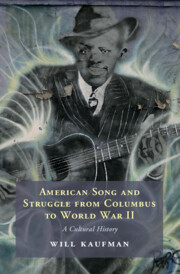Book contents
- American Song and Struggle from Columbus to World War II
- American Song and Struggle from Columbus to World War II
- Copyright page
- Praise for American Song and Struggle
- Dedication
- Contents
- Figures
- Preface
- Acknowledgments
- Introduction
- Chapter 1 Broken Spears and Songs of Sorrow
- Chapter 2 Good Newes from Virginia
- Chapter 3 A Capital Chop
- Chapter 4 If I Had but a Small Loaf of Bread
- Chapter 5 Where Today Are the Pequot?
- Chapter 6 There Is a Fountain Filled with Blood
- Chapter 7 A Tragedy That Beggared the Greek
- Chapter 8 Muscle, Blood, and Steel
- Chapter 9 Rule Anglo-Saxia
- Chapter 10 The Hand That Feeds You
- Chapter 11 We Are Many
- Chapter 12 100% American
- Chapter 13 We’re Up Against It Now
- Chapter 14 The Panic Is On
- Chapter 15 To Thee We Sing
- Conclusion
- Notes and Sources
- Song Index
- General Index
Chapter 9 - Rule Anglo-Saxia
Published online by Cambridge University Press: 30 July 2022
- American Song and Struggle from Columbus to World War II
- American Song and Struggle from Columbus to World War II
- Copyright page
- Praise for American Song and Struggle
- Dedication
- Contents
- Figures
- Preface
- Acknowledgments
- Introduction
- Chapter 1 Broken Spears and Songs of Sorrow
- Chapter 2 Good Newes from Virginia
- Chapter 3 A Capital Chop
- Chapter 4 If I Had but a Small Loaf of Bread
- Chapter 5 Where Today Are the Pequot?
- Chapter 6 There Is a Fountain Filled with Blood
- Chapter 7 A Tragedy That Beggared the Greek
- Chapter 8 Muscle, Blood, and Steel
- Chapter 9 Rule Anglo-Saxia
- Chapter 10 The Hand That Feeds You
- Chapter 11 We Are Many
- Chapter 12 100% American
- Chapter 13 We’re Up Against It Now
- Chapter 14 The Panic Is On
- Chapter 15 To Thee We Sing
- Conclusion
- Notes and Sources
- Song Index
- General Index
Summary
Woman suffragists and labor activists continue to sing together, in more than one language, while, in Chicago, the Columbian Exposition of 1893 introduces a new musical genre – ragtime – to the world. Black composers and lyricists – Scott Joplin, Paul Laurence Dunbar, Will Marion Cook, Harry T. Burleigh, Bob Cole, and the brothers James Weldon and J. Rosamond Johnson – work to free themselves from the debasements of the “coon song.” Black operatic singers like Marie Selika Williams and Sissieretta Jones carve out their careers against the tide of popular minstrelsy. A strange new phenomenon – Filipinos in “coon songs” – reflects the latest muscle flex of US Manifest Destiny: the Spanish-American War and the acquisition of Cuba, Puerto Rico, the Philippines and – for good measure – Hawai’i, all richly captured in popular song. Lili’uokalani’s overthrow and Hawaiian annexation lead to two remarkable musical by-products of US imperialism: the infiltration of Puerto Rican kachi kachi music in Hawai’i and the unique work-song body – the hole hole bushi – of the Japanese plantation laborers – all women. Meanwhile, Tin Pan Alley has a field day with the newly seized territory, transforming a site of misery and loss into a popular music paradise with the likes of “Hula Hula Dream Girl,” “Along the Way to Waikiki,” and “Oh! How She Could Yacki Hacki Wiki Wacki Woo.”
Keywords
- Type
- Chapter
- Information
- American Song and Struggle from Columbus to World War 2A Cultural History, pp. 174 - 195Publisher: Cambridge University PressPrint publication year: 2022



